2016-2017学年重大版英语必修一配套文档:Unit 4 Challenging Yourself Ⅱ 含答案
- 格式:docx
- 大小:738.73 KB
- 文档页数:12

Unit 4 Unforgettable Films一.重要词组Appreciate doing sthPray forBe strict with sbBe strict in sthBring aboutBring downBring inBring outBring backTake apartTake awayTake backTake inTake onTake overTake offTake upTake up withHave funBe full of funMake fun ofIn/for funMuch funA lot of funBe+adj+enough to doBenot+ adj+enough to do Too…toSo..thatIdentify withBe identified with Identify..withEscape sthEscape doing sth Escape…from..Escape …withHave a narrow escapeTry/do one’s best to do sth Do all one can do to doDo everything one can doDo what one can doMake an/every effort to do sth Try doing sthTry onPut onAppeal to..Appeal againstMake an appeal to sbMake ansppeal to sb to do sth Make an appeal to sb for sthPut/bring/carry..into effect Come into effectIn effectOf no effectTake effectWith effectHave/produce an effect on.. Affect sthHave an effect on sthEffectsthMake sth happenBring outPut acrossPut aboutPut asidePut awayGive awayThrow awayCarry awayChange one’s mindCome to/enter/cross one’s mind On one’s mindCall/bring sth to mindNever mindSpeak one’s mindMake up one’s mindDo you mind me/my doing sth Do you mind if I do sthWould you mind me/my doing sth Would you mind if I did sthBe equal toBe without equalBe shocked atBe shocked to do sthIt shocked sb to see/bearSearch after/forLook forHunt forSearch intoLook intoMake search forSearch throughIn search ofSearch outMake friend s withMake enem ies withBe off=leaveBe awayBe off to+地方Leave for+地方Play roles inPlay the role of sbPlay the part of sbPlay a part inHave/act a role/part inPlay an important part/role inIn respect ofWith respect toWonder at/about doing sthIt’s a wonder thatIn wonderEarn one’s/a livingMake one’s/a livingEarnbread/reputation/respect/money/salary/income believe inMake believe thatBe born into/ofEncourage sb to do sthDiscourage sb from doing sthEncourage sb in sthSeek one’s fortuneTry one’s fortuneMake a fortuneBe fortunate to do sthHave a good/bad fortuneHave faith in sb/sthLose faith in sb/sth In bad/good faithBreak/keep faith with sbRemove sth from..Remove sth to…Remove sth into..Feel like doing sthWould like to do sthLike to do /doing sthEnter sb for/in sthBeg sb forBeg…from sbBeg sb to do sthBeg to do sthBeg thatBeg for sthBeg from sbBeg sth from sbFrom then/that time onFrom now onTrain sb as/in/for…Train to do sthHand overHand downHand inHand on tosbHand outTake overSee sb doing sthCatch sb doing sthMake forMake ofMake upSpend…in doing sthSpend…on sthSbpay..forsthSth cost sb…It takes sb钱、时间to do sth Compare A with BCompare A to BCompare notes with sbBeyond/without compareBe likely to doIt is likely thatMore than likely that=almost certainAs likely as not=probablyHigh rentLow rentFree of rentRent sth out to sbRent sth from sbHide away sthHide sth awayIn return for sthIn turnThe burden of sthA burden on/to sbA burden on/to sbTo bear/carry/ease/reduce/share the burden Burden sb/oneself with sthBe burdened with sthPresent sth to sbPresent sb with sthPresent sth for sthPresent sth to sbPresent sb with sthAt presentFor the presentTurn intoTurn inTurn overTurn downTurn onTurn offTurn upTurn to二.易混词1.appreciate/enjoy/appreciative/appreciable2.pray/prey3.give/award/present/4. 4.award/prize/reward/honor5.Escape/flee6.Kind/sort/type7.Shock/surprise8.Separate/devide9.Earn/gain/win10.Match/suit/fit11.Move/remove12.Beg/request 13.From/since14.So…that15.Such..that16.Win/beat/defeat17.Probable/likely/possible18.Cause/reason/excuse19.Hurt/injure/harm/wound20.In all/in fact/in short/in return/in turn 三.语法关系副词引导的定语从句及“介词+关系代词”引导的定语从句。

高中英语必修一unit4范文全文共3篇示例,供读者参考篇1Unit 4 of High School English Book One mainly focuses on environmental protection and pollution control. In this unit, students are supposed to learn about the importance of protecting our environment, the causes and consequences of pollution, and the ways to prevent pollution.Environmental protection is everyone's responsibility, and it is crucial to raising awareness among people of all ages, especially students. By studying this unit, students will understand how their daily activities can impact the environment and learn the steps they can take to help preserve the Earth for future generations.Pollution is a major issue that threatens the health of our planet and the well-being of all living creatures. Whether it is air pollution, water pollution, or soil pollution, the consequences can be devastating. Through this unit, students will gain a deeper understanding of the causes of pollution, such as industrial waste, vehicle emissions, and improper disposal of waste.To combat pollution, individuals must take action to reduce their carbon footprint and minimize their impact on the environment. This unit provides practical solutions and tips for students to follow, such as reducing energy consumption, recycling waste, and using eco-friendly products.Overall, Unit 4 of High School English Book One is essential for students to learn about environmental protection and pollution control. By studying this unit, students will be better equipped to make responsible choices and take action to protect our planet. The knowledge and skills gained from this unit will empower students to become responsible global citizens who are committed to safeguarding the environment for future generations.篇2Unit 4: EarthquakesEarthquakes are one of the most powerful and destructive natural disasters that can occur on our planet. They are caused by the sudden release of energy in the Earth's crust, resulting in seismic waves that can shake the ground and cause buildings to collapse. In this unit, we will explore the causes and effects ofearthquakes, as well as the ways in which they can be predicted and prevented.One of the primary causes of earthquakes is the movement of tectonic plates. The Earth's crust is divided into several large pieces, known as tectonic plates, which float on the semi-fluid mantle below. When these plates move past each other, they can become stuck and build up tension. When this tension is released, it causes the ground to shake, resulting in an earthquake.Earthquakes can have devastating effects on the environment and human populations. In addition to causing buildings to collapse and roads to crack, they can also trigger landslides and tsunamis. The destruction caused by earthquakes can result in loss of life and property, as well as long-term economic and social impacts on affected communities.Fortunately, scientists have made significant advancements in predicting and mitigating the impact of earthquakes. By monitoring seismic activity and studying fault lines, they can now predict when and where an earthquake is likely to occur. This allows authorities to issue warnings and evacuate residents inat-risk areas, reducing the potential for loss of life and property damage.In addition to prediction, efforts are also being made to prevent earthquakes from causing as much damage. Building codes are being implemented to ensure that structures are able to withstand the shaking and movement caused by earthquakes. Retrofitting older buildings and infrastructure can also help to make them more resilient to seismic activity.Overall, earthquakes are a powerful force of nature that can have devastating effects on our planet. By understanding the causes and effects of earthquakes, as well as implementing measures to predict and prevent their impact, we can work towards creating a safer and more resilient world for future generations.篇3Unit 4 of the high school English textbook focuses on the topic of "Earthquakes". In this unit, students learn about the causes of earthquakes, how they are measured, their effects, and ways to prepare for and respond to earthquakes. The following essay provides an overview of the key points covered in this unit.Earthquakes are natural disasters that occur when there is a sudden release of energy in the Earth's crust, causing the ground to shake. The main cause of earthquakes is the movement oftectonic plates, which are large pieces of the Earth's lithosphere that float on the semi-fluid asthenosphere beneath them. When these plates collide, slide past each other, or pull apart, it can result in the formation of faults, where rocks on either side of the fault move in different directions. When these rocks suddenly slip along the fault, it generates seismic waves that travel through the Earth and cause the ground to shake.Earthquakes are measured using the Richter scale, which assigns a magnitude to each earthquake based on the amplitude of the seismic waves it generates. The Richter scale is logarithmic, meaning that each whole number increase in magnitude represents a tenfold increase in the amplitude of the seismic waves and approximately 31.6 times more energy released. For example, an earthquake with a magnitude of 6.0 releases 31.6 times more energy than an earthquake with a magnitude of 5.0.The effects of earthquakes can be devastating, causing buildings to collapse, bridges to fail, roads to crack, and landslides to occur. In densely populated areas, earthquakes can result in a high number of casualties and widespread destruction. To mitigate the impact of earthquakes, it is important to be prepared and know how to respond in the event of an earthquake. This includes creating an emergency plan, securingfurniture and heavy objects, and knowing the safest places to take cover during an earthquake.Overall, Unit 4 of the high school English textbook provides students with a comprehensive understanding of earthquakes and how to prepare for and respond to them. By learning about the causes of earthquakes, how they are measured, their effects, and ways to mitigate their impact, students can be better equipped to protect themselves and others in the event of an earthquake. Earthquakes are natural disasters that are a constant threat, but with proper preparation and knowledge, we can minimize their impact and stay safe.。
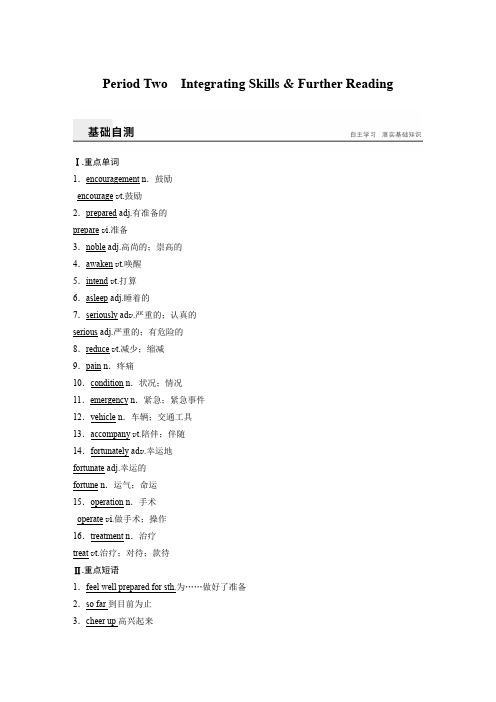
Period Two Integrating Skills & Further ReadingⅠ.重点单词1.encouragement n.鼓励encourage v t.鼓励2.prepared adj.有准备的prepare v i.准备3.noble adj.高尚的;崇高的4.awaken v t.唤醒5.intend v t.打算6.asleep adj.睡着的7.seriously ad v.严重的;认真的serious adj.严重的;有危险的8.reduce v t.减少;缩减9.pain n.疼痛10.condition n.状况;情况11.emergency n.紧急;紧急事件12.vehicle n.车辆;交通工具13.accompany v t.陪伴;伴随14.fortunately ad v.幸运地fortunate adj.幸运的fortune n.运气;命运15.operation n.手术operate v i.做手术;操作16.treatment n.治疗treat v t.治疗;对待;款待Ⅱ.重点短语1.feel well prepared for sth.为……做好了准备2.so far到目前为止3.cheer up高兴起来4.be awakened by sth.被……弄醒;被……唤醒5.intend to do sth.打算做某事6.tide sb. over sth.渡过;克服(困难等)7.in no time很快;立刻8.accompany sb.to (a place)陪同某人去……9.go through sth.经历;完成10.all kinds of...各种各样的……11.in time及时;还早12.prepare oneself for sth.为……做好准备Ⅲ.好句积累1.I was sleeping soundly last night when I was awakened by someone’s groans.昨天晚上我睡得正香,突然被某个人的呻吟声惊醒了。

Part I 文本分析一 基于课标二 基于语料 What Tom Hanks 是一篇人物传记,介绍了汤姆·汉克斯从出生、求学、工作到获得奥斯卡大奖等信息。
文章通过时间顺序的推移,依次描述了主人公在每个阶段的成长变化和取得的成就。
Why 将著名影星汤姆·汉克斯通过人物传记方式呈现其成长经历、成名历程和卓越成就。
How本文对主人翁的成长经历、成名历程是按照时间顺序展开,同时也对各个时期汤姆·汉克斯的经历对他成长带来的影响以及他取得的成绩进行了介绍,使读者了解了他的成长背景、如何爱上表演、在表演上获得了哪些成绩以及成功后为社会做的贡献。
Part II 学情分析授课对象是高一年级的学生。
大多数同学已具备从文本中提取主要信息,用英语进行表达的能力。
此外,学生对汤姆·汉克斯本人所参演过的电影比较熟悉,文本内容能引起同学们兴趣。
但大部分学生对他本人的成长史了解较少。
同时,文中还有一些熟词生义(如star, address, cause )的现象。
通过文章篇章结构分析和主要信息梳理,将有利于学生的有效语言输出。
Part III 教学目标1.通过调查表中的生词和呈现部分所提供关键词,引导学生重视语言基础,培养他们的语言能力;2.通过快速阅读,引导学生要重视文本主题与语篇;培养他们的主题意识和阅读能力;3.通过思维导图,引导学生梳理文本线索及相关主要信息,获取文化知识,培养他们信息处理的能力 和文化意识;4.通过分组讨论,引导学生对文本中的某些信息进行深度思考,培养他们的思辨能力,发展思维品质;5.通过对本文结构仿写一位“你最喜欢的电影明星”的作业,培养学生的迁移创新能力。
6.通过Jigsaw 活动方式,引导学生进行自主学习,合作学习和探究学习,优化他们的学习方式;7.通过课前分享学习目标和课后学习反思,引导学生养成目标意识,同时及时反思学习方式和效果, 发展他们的学习策略,提升他们的学习能力。
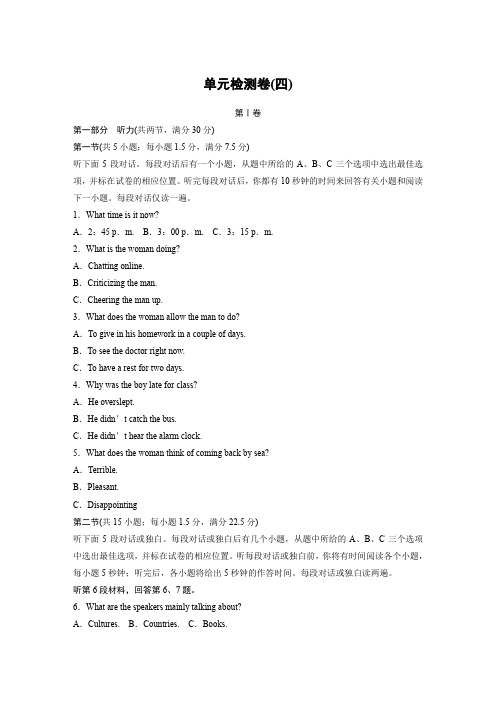
单元检测卷(四)第Ⅰ卷第一部分听力(共两节,满分30分)第一节(共5小题;每小题1.5分,满分7.5分)听下面5段对话。
每段对话后有一个小题,从题中所给的A、B、C三个选项中选出最佳选项,并标在试卷的相应位置。
听完每段对话后,你都有10秒钟的时间来回答有关小题和阅读下一小题。
每段对话仅读一遍。
1.What time is it now?A.2:45 p.m. B.3:00 p.m. C.3:15 p.m.2.What is the woman doing?A.Chatting online.B.Criticizing the man.C.Cheering the man up.3.What does the woman allow the man to do?A.To give in his homework in a couple of days.B.To see the doctor right now.C.To have a rest for two days.4.Why was the boy late for class?A.He overslept.B.He didn’t catch the bus.C.He didn’t hear the alarm clock.5.What does the woman think of coming back by sea?A.Terrible.B.Pleasant.C.Disappointing第二节(共15小题;每小题1.5分,满分22.5分)听下面5段对话或独白。
每段对话或独白后有几个小题,从题中所给的A、B、C三个选项中选出最佳选项,并标在试卷的相应位置。
听每段对话或独白前,你将有时间阅读各个小题,每小题5秒钟;听完后,各小题将给出5秒钟的作答时间。
每段对话或独白读两遍。
听第6段材料,回答第6、7题。
6.What are the speakers mainly talking about?A.Cultures. B.Countries. C.Books.7.What interests the man about China?A.The food.B.The history.C.The architecture.听第7段材料,回答8、9题。

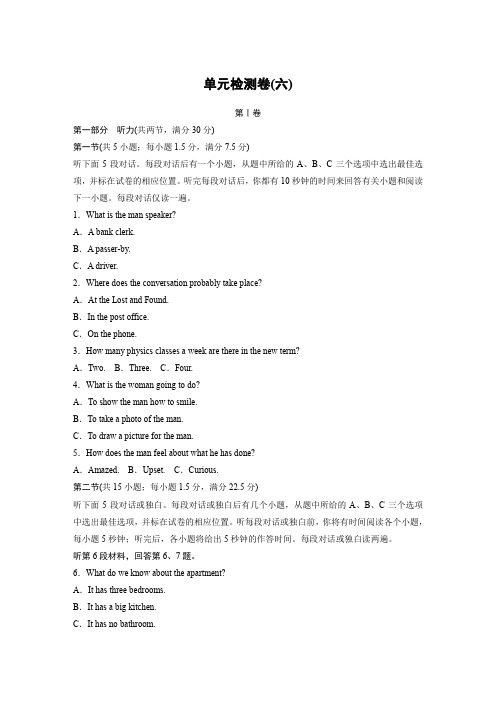
单元检测卷(六)第Ⅰ卷第一部分听力(共两节,满分30分)第一节(共5小题;每小题1.5分,满分7.5分)听下面5段对话。
每段对话后有一个小题,从题中所给的A、B、C三个选项中选出最佳选项,并标在试卷的相应位置。
听完每段对话后,你都有10秒钟的时间来回答有关小题和阅读下一小题。
每段对话仅读一遍。
1.What is the man speaker?A.A bank clerk.B.A passer-by.C.A driver.2.Where does the conversation probably take place?A.At the Lost and Found.B.In the post office.C.On the phone.3.How many physics classes a week are there in the new term?A.Two. B.Three. C.Four.4.What is the woman going to do?A.To show the man how to smile.B.To take a photo of the man.C.To draw a picture for the man.5.How does the man feel about what he has done?A.Amazed. B.Upset. C.Curious.第二节(共15小题;每小题1.5分,满分22.5分)听下面5段对话或独白。
每段对话或独白后有几个小题,从题中所给的A、B、C三个选项中选出最佳选项,并标在试卷的相应位置。
听每段对话或独白前,你将有时间阅读各个小题,每小题5秒钟;听完后,各小题将给出5秒钟的作答时间。
每段对话或独白读两遍。
听第6段材料,回答第6、7题。
6.What do we know about the apartment?A.It has three bedrooms.B.It has a big kitchen.C.It has no bathroom.7.How often does the woman want the rent to be paid?A.Once a month.B.Once every six months.C.Once every three months.8.What will the man do tomorrow?A.Wait for the woman’s call.B.Give the woman his rent.C.Take a look at the apartment.听第7段材料,回答第9至11题。


Kathy started at my nursery school at the age of three.She settled into the group easily,and would be first on the slide and highest up the climbing frame.She could put on her coat without help and not only fasten her own buttons but other children’s,too.She was a lovely child but unfortunately a scratcher(抓挠人者).If anyone upset her or stood in her way,her right hand would flash out fast and scratch down the face of her playmates.Children twice her age would fly in fear from her.This had to be stopped.All the usual ways failed and then I thought of Atkinson Highfield School.No punishment had been given there,but the attacker had been ignored.So I decided to try out on Kathy.Kathy was so quick that it was impossible to stop her scratching,but I decided to stay within arm’s length all afternoon.All was peaceful but then I saw Kathy’s hand moved and heard the scream.Gently I gathered up the little hurt one in my arms and said “Nice,nice candy” and then Kathy looked puzzled when she got nothing.Soon came another scream,this time from John.While holding him in my arms,I said,“Look,Kathy,nice candy for John” and I put it into John’s mouth.A smile of understanding came across Kathy’s face.Minutes later,she came to me and said loudly,“Give me a candy!I have hurt my finger!”“No,” I answered,“you’ll get it if someone hurts you.”On purpose,she turned and scratched a nearby boy,Tom,and waited quietly while I mothered and rewarded Tom,then she walked away.She has never scratched a child ever since.Parents who find older children bullying(欺负) younger brothers or sisters might do well to replace shouting and punishment by rewarding and giving more attention to the injured ones.It’s certainly much easier and more effective.根据上文完成下列各题1.Why would Kathy scratch other children?A.Because she was only a child.B.Because someone upset her or stood in her way.C.Because she was always punished.D.Because she thought it was rewarding for herself.答案 B2.Why did Kathy scratch Tom?A.Because Kathy was in the habit of scratching other children.B.Because Tom was nearby her.C.Because Kathy wanted Tom to hurt her.D.Because the writer mothered and rewarded Tom.答案 CPeriod One Getting Ready & ReadingⅠ.重点单词1.whisper v t.耳语;悄悄说2.cheating n.欺骗;作弊cheat v i./v t.欺骗;作弊3.belief n.相信;信念believe v t.相信4.tap v t.轻拍;轻敲5.mad adj.生气的6.guard v t.守护;防御7.silence n.沉默;寂静silent adj.沉默的;寂静的8.destroy v t.破坏;毁掉9.slowly ad v.慢慢地;迟缓地slow adj.慢的;迟钝的10.gently ad v.温柔地;柔和地;轻轻地gentle adj.温柔的;柔和的;轻轻的11.breathe v i.呼吸;呼气;吸气breath n.呼吸;气息12.relief n.减轻;解除Ⅱ.重点短语1.keep one’s eyes on sb./sth.密切注视……;注意……2.think to oneself自个儿想;独自思考3.go against sb./sth.违反……;反对……;不利于……4.for a moment一会儿5.in silence沉默地;无声地6.search for sb./sth.搜寻……;寻找……7.give it a try试一试8.feel relieved宽心;释然Ⅲ.好句积累1.I gave him a smile,not sure whether he was joking or not,and returned to my test. 我朝他微笑了一下,不确定他是否是在开玩笑,便又继续做我的试题。

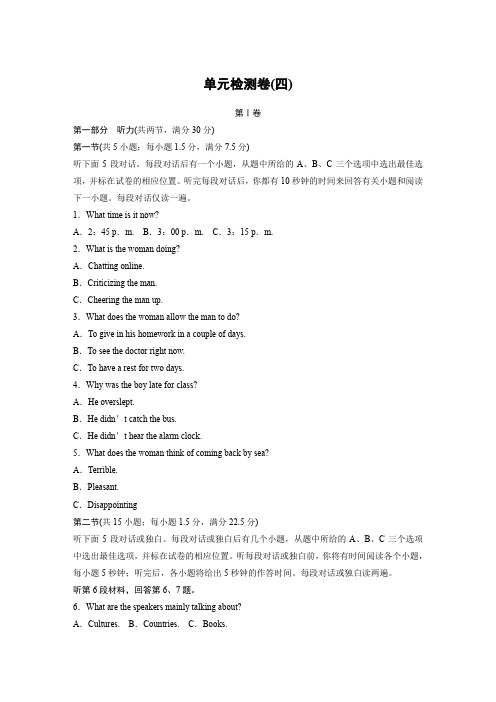
单元检测卷(四)第Ⅰ卷第一部分听力(共两节,满分30分)第一节(共5小题;每小题1.5分,满分7.5分)听下面5段对话。
每段对话后有一个小题,从题中所给的A、B、C三个选项中选出最佳选项,并标在试卷的相应位置。
听完每段对话后,你都有10秒钟的时间来回答有关小题和阅读下一小题。
每段对话仅读一遍。
1.What time is it now?A.2:45 p.m. B.3:00 p.m. C.3:15 p.m.2.What is the woman doing?A.Chatting online.B.Criticizing the man.C.Cheering the man up.3.What does the woman allow the man to do?A.To give in his homework in a couple of days.B.To see the doctor right now.C.To have a rest for two days.4.Why was the boy late for class?A.He overslept.B.He didn’t catch the bus.C.He didn’t hear the alarm clock.5.What does the woman think of coming back by sea?A.Terrible.B.Pleasant.C.Disappointing第二节(共15小题;每小题1.5分,满分22.5分)听下面5段对话或独白。
每段对话或独白后有几个小题,从题中所给的A、B、C三个选项中选出最佳选项,并标在试卷的相应位置。
听每段对话或独白前,你将有时间阅读各个小题,每小题5秒钟;听完后,各小题将给出5秒钟的作答时间。
每段对话或独白读两遍。
听第6段材料,回答第6、7题。
6.What are the speakers mainly talking about?A.Cultures. B.Countries. C.Books.7.What interests the man about China?A.The food.B.The history.C.The architecture.听第7段材料,回答8、9题。


单元检测卷(一)第Ⅰ卷第一部分听力(共两节,满分30分)第一节(共5小题;每小题1.5分,满分7.5分)听下面5段对话。
每段对话后有一个小题,从题中所给的A、B、C三个选项中选出最佳选项,并标在试卷的相应位置。
听完每段对话后,你都有10秒钟的时间来回答有关小题和阅读下一小题。
每段对话仅读一遍。
1.WhoseiPodwillthewomanborrow?A.John’s.B.Adam’s.C.Michael’s. 2.Whatdoesthemanhavetodofirst?A.Cleanhisroom.B.Buymovietickets.C.Borrowsomemoneyfromhisfriends. 3.Wherecanthewomanfindthebutter?A.Inrow10.B.Behindthespeakers.C.Inthemiddleofthestore.4.Whatwillthewomandrink?A.Acupofcoffee.B.Aglassofwater.C.Someorangejuice.5.Whatdoesthewomansuggestthemando?A.Lookathiscards.B.Puthiscardsdown.C.Usedifferentcards.第二节(共15小题;每小题1.5分,满分22.5分)听下面5段对话或独白。
每段对话或独白后有几个小题,从题中所给的A、B、C 三个选项中选出最佳选项,并标在试卷的相应位置。
听每段对话或独白前,你将有时间阅读各个小题,每小题5秒钟;听完后,各小题将给出5秒钟的作答时间。
每段对话或独白读两遍。
听第6段材料,回答第6、7题。
6.HowisMariarelatedtothegirl?A.Herroommate.B.Herclassmate.C.Hermathteacher.7.WhatdoesthemanthinkofMaria?A.She’slazy.B.She’sintelligent.C.Sheisn’tagoodperson.听第7段材料,回答第8、9题。

单元检测卷(五)第Ⅰ卷第一部分听力(共两节,满分30分)第一节(共5小题;每小题1.5分,满分7.5分)听下面5段对话。
每段对话后有一个小题,从题中所给的A、B、C三个选项中选出最佳选项,并标在试卷的相应位置。
听完每段对话后,你都有10秒钟的时间来回答有关小题和阅读下一小题。
每段对话仅读一遍。
1.When will the speakers go on holiday?A.In September.B.In July.C.In June.2.How does the man think the woman lose weight?A.By doing some exercise.B.By being careful about eating.C.By taking some pills.3.What do we know about the woman?A.Her chest hurts.B.She is unwilling to see the doctor.C.She has an appointment with her doctor.4.What is the man doing?A.Reporting his work.B.Asking for a pay raise.C.Applying for a holiday.5.What does the woman mean?A.John is very interesting.B.John always makes her laugh.C.She doesn’t appreciate John’s humour.第二节(共15小题;每小题1.5分,满分22.5分)听下面5段对话或独白。
每段对话或独白后有几个小题,从题中所给的A、B、C三个选项中选出最佳选项,并标在试卷的相应位置。
听每段对话或独白前,你将有时间阅读各个小题,每小题5秒钟;听完后,各小题将给出5秒钟的作答时间。
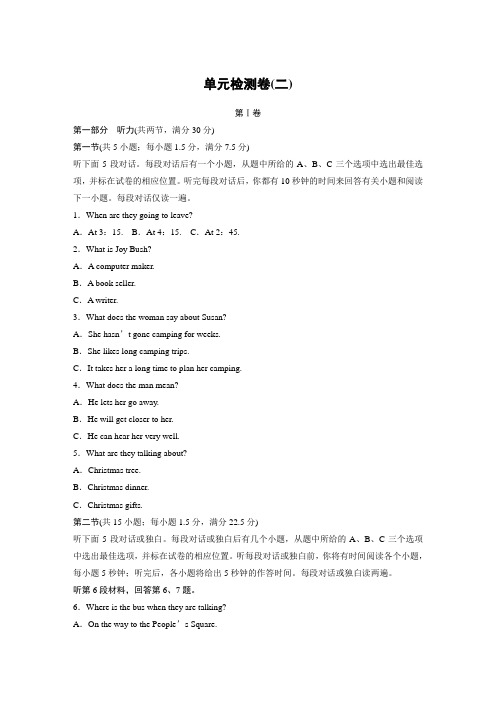
单元检测卷(二)第Ⅰ卷第一部分听力(共两节,满分30分)第一节(共5小题;每小题1.5分,满分7.5分)听下面5段对话。
每段对话后有一个小题,从题中所给的A、B、C三个选项中选出最佳选项,并标在试卷的相应位置。
听完每段对话后,你都有10秒钟的时间来回答有关小题和阅读下一小题。
每段对话仅读一遍。
1.When are they going to leave?A.At 3:15. B.At 4:15. C.At 2:45.2.What is Joy Bush?A.A computer maker.B.A book seller.C.A writer.3.What does the woman say about Susan?A.She hasn’t gone camping for weeks.B.She likes long camping trips.C.It takes her a long time to plan her camping.4.What does the man mean?A.He lets her go away.B.He will get closer to her.C.He can hear her very well.5.What are they talking about?A.Christmas tree.B.Christmas dinner.C.Christmas gifts.第二节(共15小题;每小题1.5分,满分22.5分)听下面5段对话或独白。
每段对话或独白后有几个小题,从题中所给的A、B、C三个选项中选出最佳选项,并标在试卷的相应位置。
听每段对话或独白前,你将有时间阅读各个小题,每小题5秒钟;听完后,各小题将给出5秒钟的作答时间。
每段对话或独白读两遍。
听第6段材料,回答第6、7题。
6.Where is the bus when they are talking?A.On the way to the People’s Square.B.At the People’s Square.C.At the bus stop.7.How will the man recognize the People’s Square?A.Watch for the big statue.B.Watch for it himself.C.The woman will tell him.8.What can we learn from the talk?A.The man took the bus by mistake.B.It was the first time for the man to the People’s Square.C.The bus wasn’t crowded at all.听第7段材料,回答第9至11题。
Ⅰ.重点单词1.politics n.政治2.biology n.生物3.consist v i.组成4.management n.管理manage v t.管理5.passing adj.及格的pass v i./v t.及格;通过6.acceptable adj.可接受的accept v t.接受7.extremely ad v.极端地;非常地extreme adj.极端的;极度的8.strictly ad v.严格地strict adj.严格的9.insist v i.坚持;极力要求10.scholarship n.奖学金scholar n.学者;获奖学金的学生Ⅱ.重点短语1.once upon a time从前;很久以前2.set up建造3.consist of sth.由……组成;由……构成4.be (very) poor in sth.不擅长……;在……方面(学得、做得)不好5.in order to do sth.为了;以便;目的是6.instead of代替;作为……的替换7.insist on sth.坚持;坚决要求/主张8.because of因为;由于Ⅲ.好句积累1.To make the school management easier,all the animals had to take all the subjects. 为了使学校管理更容易,所有动物必须学所有的课程。
2.She went on practising running until her webbed feet were badly worn.她坚持练习跑步,直到她那双蹼脚都磨烂了。
3.It is said that the new cinema of this city was badly damaged in a big fire.据说这个城市的新电影院在一场大火中被严重损坏了。
4.No matter how difficult it is going to be,we will never give up.无论它将多么困难,我们永不会放弃。
Ⅰ.课文阅读理解1.In the animal school,the animals had to take all the subjects except . A.running B.jumpingC.climbing D.swimming答案 B2.Although practised a lot yet failed to pass the running test.A.the rabbit B.the eagleC.the duck D.the squirrel答案 C3.Which of the following animals had the highest average and got the scholarship finally? A.The eel. B.The squirrel.C.The duck. D.The rabbit.答案 A4.The rabbit left school because .A.he was tired of learningB.he was poor in runningC.he couldn’t pass the running examD.he failed in the swimming exam over and over答案 D5.The eagle was strictly disciplined because .A.he was naughtyB.he was honestC.he often made troublesD.he was too clever答案 CⅡ.课文语法填空The animals set up a school.1.Their subjects included running,climbing,swimming 2.and flying.All the animals had to take all the subjects.The duck was excellent in swimming,3.but made only a 4.passing (pass) grade in flying and was very poor 5.in running.She had to stay after school and also gave up 6.swimming (swim) in order to practise running.Finally,she didn’t pass the running test and was only average in swimming.The rabbit was at 7.the top of the class in running but couldn’t pass the swimming exam.The squirrel 8.got (get) a “C” in climbing and a “D” in flying.The eagle got a “C” in climbing.A little eel had the 9.highest (high) average and got the scholarship 10.at the end of the year.But average was acceptable in school,so nobody worried about that except the duck herself. 但是这样的成绩在学校里是可以接受的,所以除了小鸭自己,没有人担心这事儿。
[归纳拓展]acceptable adj.可接受的;(社会上)认同的;认可的;令人满意的;还可以的accept v t.接受;承认;认可accept...as...承认……为……be accepted as...被承认是……It is generally accepted that...普遍认为……acceptance n.接受;同意;认可[语境感悟](1)We must think out an acceptable way to settle the problem.我们必须想出一个可接受的办法来解决问题。
(2)He accepted my invitation to the party.他接受了我对他参加聚会的邀请。
(3)It is generally accepted that exercise is good for health.普遍认为,锻炼对身体有好处。
receive[即时跟踪](1)用accept,receive的适当形式填空①I received a letter from my parents yesterday.②I can’t accept such an expensive present.(2)语法填空①It is not socially acceptable (accept) for parents to leave children away at that age.②It is generally accepted that people are motivated by success.1.Their subjects consisted of running,climbing,swimming and flying.他们的课程由跑步、攀爬、游泳与飞翔构成。
[归纳拓展]consist of...由……组成;由……构成(无被动形式,无进行时)consist in(=lie in)在于,存在于consist with与……一致;并存[语境感悟](1)The United Kingdom consists of Great Britain and Northern Ireland.英国由大不列颠和北爱尔兰组成。
(2)The true wealth does not consist in what we have,but in what we are.真正的财富不在于我们拥有什么,而在于我们的人格。
(3)Theory should consist with practice.理论应与实践相一致。
注意表示“组成,构成”的短语还有:make up,be made up of,be composed of等。
[即时跟踪](1)句型转换Our class consists of 51 students.Our class is made up of 51 students.Fifty-one students make up our class.(2)单句改错The soup consists tomatoes,meat and peas,doesn’t it?consists后加of2....she had to stay after school and also gave up swimming in order to practise running.……她不得不在放学后留下,并且为了练习跑步也放弃了游泳。
[归纳拓展]in order to...为了……,既可以用在句首,也可以用在句中。
so as to...为了……,不能用在句首。
in order to的否定式是在不定式符号to前加not或者never。
in order that为了……,以便…… (后接目的状语从句)so that为了……(后接目的状语从句或结果状语从句)[语境感悟](1)She arrived early in order to get a good seat.她早早到场,以便找个好位置。
(2)They hurried up in order not to be late for class.他们急忙赶路以便上课不迟到。
(3)In order that he could not be late,his mother woke him up at 6.为了防止他迟到,母亲6点钟叫醒了他。
[即时跟踪](1)句型转换We started early in order to arrive before dark.We started early in order that we could arrive before dark.We started early so that we could arrive before dark.(2)一句多译为了通过考试,他努力学功课。